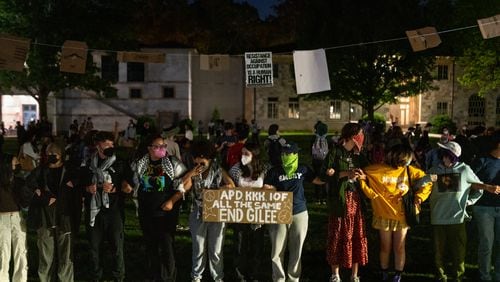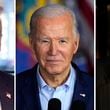Georgia Democrats are trying to ignite a revolt against Republicans in a swath of diverse suburbs across metro Atlanta and other bedroom communities in the state.
The party hopes to capitalize on President Donald Trump’s low approval ratings in areas that once were conservative strongholds but are fast becoming prime political battlegrounds because of changing demographics and the increasing political muscle of educated women.
Democrats are again circling Georgia’s 6th Congressional District — held by Republicans last year after the most expensive U.S. House race ever — but might have a better opportunity in a Gwinnett County-based seat next door in their larger quest to take back control of the chamber.
Statewide candidates are zeroing in on leafy subdivisions that were once a wasteland for Democrats. And political newcomers are targeting Republicans long considered so unassailable many haven’t had a credible challenger in years.
The Gold Dome is already being reshaped by the suburban strategy. Three long-held Republican legislative seats flipped last year in special elections. And nearly a dozen GOP state legislators representing suburban districts have announced plans to retire or run for other office, leaving competitive seats open.
But the path ahead for Democrats remains daunting — the district lines were drawn by the GOP-controlled Legislature, after all — and many past contenders who banked on the same trends saw their efforts collapse. They also must navigate crowded primary battles in races for seats that Democrats once dreamed of recruiting one contender.
Plus, Republicans need only to point at U.S. Rep. Karen Handel — the victor of the 6th District race — as an antidote to Democratic dreams of taking the suburbs.
“Democrats may feel burned a little bit by what happened in Georgia 6th” last year, said Kyle Kondik of the University of Virginia Center for Politics. “But it very well could be competitive again.”
‘Disgusted’
That contest wound up being seen nationally as a litmus test for Trump’s popularity in conservative-tilting ‘burbs — and a gauge of Democratic enthusiasm for a seat that was in Republican hands for decades.
There was no shortage of energy, excitement or expenses. Democrat Jon Ossoff, the runner-up in that contest, shattered records by raising $30 million for the campaign. And Handel fended him off in part by appealing to the district’s conservative core and embracing Trump and all other GOP figures willing to help her.
Her 4-point victory forged her into something of a Republican model for winning in the Trump era. At a recent closed-door meeting with Republican lawmakers eyeing their upcoming re-election battles, Handel urged them to embrace data-driven strategies and tie their opponents to U.S. House Minority Leader Nancy Pelosi and other unpopular Democratic figures.
“Voters are looking for individuals who they can trust and believe in and who will work hard to represent their interests,” Handel said in an interview this week.
Ossoff still hasn’t announced whether he’s making a comeback bid, though his lengthy list of donors and name recognition would make him the Democratic front-runner. But the Democrats who have already lined up to challenge Handel say they’re in the contest regardless — and they plan to criticize Trump more aggressively than Ossoff.
“Families like mine are disgusted with what they’re seeing out of Washington in this White House, and our neighbors in the suburbs know this is not normal,” said Bobby Kaple, a former newscaster who is running for the seat. “You’re afraid to turn on the news for fear that the president will say something that your children will repeat in school.”
A Democratic rival, Kevin Abel, said he’s tailored a business-friendly message that can appeal to conservatives thanks to decades in the technology business in Alpharetta. But he said even the staunchest conservatives in the district are antsy about Trump and eager for a more independent voice.
“There’s no conceivable way Trump can’t be a factor,” Abel said. “I’m not running as the anti-Trump candidate — our problems are greater than who the occupant of the White House is — but you can’t ignore the overwhelming impact he’s had on policy and the dialogue in this country.”
Handel’s tried to defend the district with a mix of base-pleasing initiatives and grass-roots outreach.
She called for a congressional investigation into Larry Nassar, the disgraced physician for USA Gymnastics who was convicted of sexually abusing scores of patients. And at campaign stops, she focuses on the $1.5 trillion GOP tax cut plan, pointing to corporate giants that doled out bonuses to employees after the overhaul was approved.
“It’s about being engaged with the constituency and being a member of that community from as many aspects as possible,” she said.
‘Funneling the energy’
National Democrats, meanwhile, are trying to use that tax overhaul against Handel and her colleague Rob Woodall, who represents the district next door.
Like the 6th, the Gwinnett and Forsyth County-based 7th Congressional District is filled with well-educated voters, including many who commute to high-paying jobs in Atlanta. It's also incredibly diverse — Gwinnett is now majority-minority — and only barely voted for Trump in 2016 after giving Mitt Romney a wide margin of victory four years earlier.
Woodall, R-Lawrenceville, has cruised to re-election there since 2010, but he’s a relatively weak fundraiser, which has caught the attention of Democrats hunting for new battlegrounds.
No fewer than six Democrats have stepped up to challenge Woodall this year, along with one conservative Republican. Many are first-time candidates.
One of those political newbies is Ethan Pham, a 36-year-old Duluth-based lawyer whose family immigrated to Georgia from Vietnam after fighting the Communist regime. He said he felt compelled to run following Trump’s election.
“His words and actions are eerily reminiscent of things that are said and done by dictators around the world,” Pham said. “My dad and granddads fought against the Communist regime, and so my family did not leave one authoritarian regime to go live in another.”
Another first-time candidate is Carolyn Bourdeaux, a Georgia State University policy professor who entered the race with a health care-focused platform. Six months after jumping into the race, Bourdeaux said she's been surprised at the influence of informal Facebook political networks such as PaveItBlue.
“What is going on is that there is just a tremendous amount of energy, and to some degree what we’re doing is just funneling the energy along,” she said. “A lot of this is obviously coming from women.”
The race so far has been relatively quiet, but at least two Democrats have outraised Woodall in recent campaign finance filings. Political handicappers still don’t classify the 7th as competitive as its neighbor to the west, in part because of deeply conservative Forsyth County.
For his part, Woodall said outside Democratic groups are misreading the political inclinations of the 7th District.
“I think my Democratic friends are making a big mistake when they roll into districts like mine and start preaching an entitlement culture,” he said. “This really is a meritocracy that we have going in the 7th District, folks working hard every day to make things better for their kids tomorrow then they were yesterday, and dagnammit, we’re succeeding.”
‘Go for the suburbs’
Statewide candidates are trading on the same suburban strategy, with hopes of persuading more moderate voters — particularly women — to defect from the GOP. Republicans have held focus groups to test messages on the economy and health care to try to prevent attrition.
“The Trump dynamic means that the suburban Republicans are going to have to spend more money and more time (to get re-elected),” GOP campaign strategist Chip Lake said, “and that the margins are not going to be as high as they have been in the past.”
In 2016, many Republicans in Atlanta's suburbs faced little — or no — opposition. That meant potentially vulnerable incumbents, including a Dunwoody Republican who pleaded guilty to charges of drunken driving in the middle of the day, easily coasted to another term.
This cycle, Democrats have already recruited more than a dozen candidates for suburban districts. And several state House Republicans representing competitive seats — including David Casas of Lilburn, Rich Golick of Smyrna, Tom Taylor of Dunwoody and Wendell Willard of Sandy Springs — are not seeking another term.
In the state Senate, David Shafer's bid for lieutenant governor leaves open another competitive seat in Gwinnett County. And Democrats are challenging other suburban districts where Ossoff and Hillary Clinton performed well, such as Fran Millar's Dunwoody-based seat.
Jen Slipakoff, a civil rights advocate, is painting a target on one of the most comfortable incumbents in the Legislature: state Rep. Earl Ehrhart, the longest-serving Republican in the Georgia House. He hasn't faced an opponent in more than a decade.
For months, Slipakoff has knocked on doors and rallied Democrats in the conservative-leaning Cobb County district. She shrugs off attempts by her critics to paint her as a liberal.
“What people really want is someone who is going to listen to them, care about the things they care about and someone who is going to lead with integrity,” she said. “Being a conservative, being a liberal — that doesn’t play in. Voters want integrity and compassion. They feel very ignored.”









